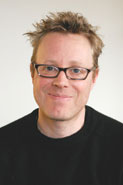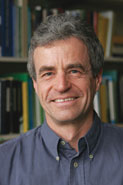Election Monday to Super Bowl Sunday
Election Monday to Super Bowl Sunday McGill University
User Tools (skip):
Headliners
Election Monday to Super Bowl Sunday
Of New York, Frank Sinatra famously belted "If I can make it there/I'll make it anywhere." And with connections like he had, who's to argue with Ol' Blue Eyes? In that case, a number of McGillians have recently "made it" with their inclusion in the venerable New York Times.
First, Jody Heymann, director of the Institute for Health and Social Policy at McGill, was cited in a recent article outlining a U.N. report that detailed the sad lack of statistical data on women living in poverty. Heymann is an expert on the subject, with her ground-breaking book on the plight of working families around the world, Forgotten Families, set to be released in March by Oxford University Press.
Next up, in the Times' coverage of our federal elections, Antonia Maioni, director of the McGill Institute for the Study of Canada was quoted as saying "That there is room for a federalist voice in Quebec is a Rubicon." Of course, with just a minority government, "Julius" Harper may prove to be but a Little Caesar.

PTSD specialist Alain Brunet.
Owen Egan
Speaking of election fallout, maybe Paul Martin should look up Alain Brunet, a doctor in the Department of Psychiatry in the Douglas Hospital and an expert in post-traumatic stress disorder (PTSD). The Chicago Sun-Times and Miami Herald both ran a story about Brunet's work on a "trauma pill" that could lessen the intensity of painful memories. Surprisingly, Brunet is finding it difficult to recruit study participants. Interested parties should call (514) 761-6131, extension 2368.

Long-snapper champ Jean-Philippe Darche.
Corky Trew, courtesy of McGill Athletics
And to continue in the electoral vein, unlike the Liberals, McGill alum Jean-Philippe Darche is making news by not fumbling the football. Darche is a member of the NFL's Seattle Seahawks and is preparing for Super Bowl XL - the first McGill grad to reach football's ultimate game. As a long-snapper, Darche's sole on-field responsibility is to pass the ball backwards between his legs to the kicker. That's it. Over the course of a full game, he may see action in 10 plays, totaling about one minute. As the Super Bowl nears, Darche, who has already been featured in USA Today, is popping up in local papers like Journal de Montréal and 24 Heures.

Biodiversity expert Michel Loreau.
Owen Egan
And, finally, Michel Loreau, Canada Research Chair in Theoretical Community and Ecosystem Ecology, had a Q&A session with Le Monde in his capacity as the chair of the scientific committee of DIVERSITAS, the international program of biodiversity science. Loreau doesn't paint a pretty picture of the future state of the ecology of the twenty-first century. Citing deforestation, urbanization and climate change, Loreau predicted we will endure a period of massive extinction among species. The subsequent change in biodiversity could have catastrophic results, including a population explosion among certain species of animals, the outbreak of disease and a substantial lessening of productivity of our ecosystems. The only thing gloomier? Le Monde referred to us as "Mac-Gill."

